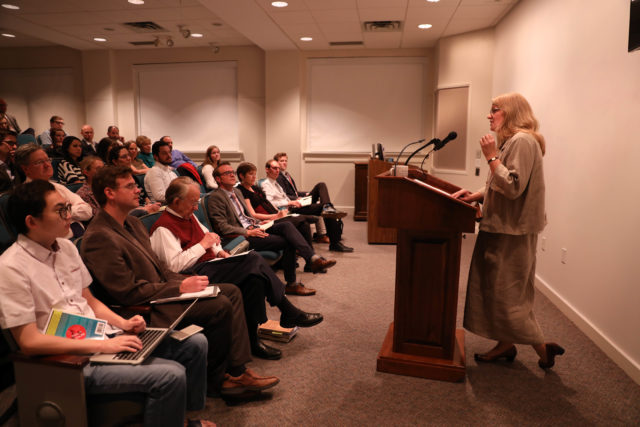Dr. Sarah C. Williams spoke about “Outward Signs and Inward Graces: The Place of Popular Religion in the Age of Urbanization and Empire.” The lecture, which was sponsored by the history department, the Institution for Faith and Learning, and the Armstrong Browning Library took place in the Armstrong Browning Library Lecture Hall on Friday afternoon. Students and professors from the history and English departments extended a warm welcome to her.
Williams is a research professor of history of Christianity from Regent College, located in Vancouver, British Columbia. She is a specialist in the field of nineteenth- and twentieth-century social and cultural history, and she focuses her research on the relationship between religion and culture.
Dr. Joshua King, associate professor in the English department introduced Williams and described her as one of the premier historians of social and cultural history of religion.
“The content of her talk of Dr. Williams’s research is really to do with two main things among others: one is popular religion from the nineteenth century meaning how did people actually experience and practice religion, not just who are in charge of teaching, but also people who were underground. Another aspect of her research is to do with women in religion – how did women in the nineteenth century experience religion,” King said.
Dr. Andrea Turpin, assistant professor in the history department, showed her appreciation of Williams and emphasized the reason why she attended Williams’s speech.
“I wanted to hear her wisdom on how to understand the different ways people have practiced Christianity in the past. She studies the time period I find most interesting—the nineteenth and early twentieth centuries—but I know much less about Britain during that time than I do about the United States,” Turpin said.
Williams began the lecture by sharing her interpretation of difficulties and challenges of doing justice to this part of history from readings and researches.
“There is a big problem when we come to study this time period,” Williams said. “And to study a popular religion, historians really have to centralize the criteria by which the participants themselves describe their own believes. To do adequate justice to this, we need to do something else as well. We need to think about how to read the time period. We also have to shed some of our categories. Categories are like natural or super natural, Christian or unchristian, orthodox or unorthodox, elite or common.”
Williams also said it is particularly difficult to get rid of some of binding categories for those who are coming from a faith perspective.
Williams also discussed how popular beliefs were multi-dimensional. She used working-class women and children in that period as an example to explain this point.
“Working-class women, for example, who would insist sending their children to Sunday schools…which could in fact be to identify the whole family with a given church. It was very significant in London. For women, who entered the society unchurched, was a risk of ill fortune, bad luck for the mother, child and community. There were also restrictions from the society in the late nineteenth century,” Williams said.
Williams also found in her research that Jesus was drawn into arguments about the role of churches. For example, in the late nineteenth century, churches thought people should come to church every Sunday to show their royalty because they thought that Jesus asked them to do so, Williams said.
“Jesus doesn’t require people to come to the church. He does require people to be good neighbors,” Williams said. “No matter if it is urban or rural cities, higher- or lower-class people, they have their own ways to practice religion. But maybe from the angles of passers and clergies, they would consider they are not religious enough at that moment.”
King also has the same interpretation and explained some of the details of Williams’ lecture.
“Lower-class people seemed not to be religious in the late nineteenth century. We should notice that some people may only go to church a few times in the year, still consider themselves Christian, and mixing their Christian belief with things we might call ‘magic’ like you stick a pen into an apple and it will curse someone else. It’s for those people a form of Christian faith,” King said. “Williams was arguing with we should be more willing to see how diverse the ways people practiced their faith. And that might change the way we think the history.”



